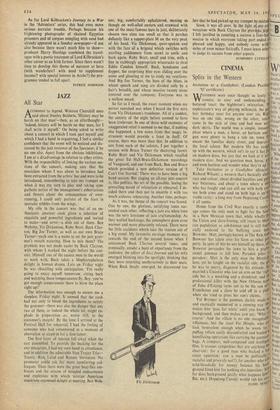JAZZ All Star
ACCORDING to legend, Winston Churchill once ..said about Stanley Baldwin, 'Hist'ory may be harsh on that man'—then, as an afterthought— 'indeed, history will be harsh on that man, for I shall write it myself.' On being asked to write about a concert in which I took part myself and which I had a hand in organising, I feel a similar confidence that the event will be noticed and dis- cussed by the jazz reviewer of the Spectator, if by no one else. Apart from the obvious inhibitions, I am at a disadvantage in relation to other critics. With the responsibility of linking the various sec- tions of the concert, making sure that the musicians whom I was about to introduce had been extracted from the artists' bar and were to be introduced, remembering to take my trumpet on when it was my turn to play and taking sym- pathetic notice of the-management's exhortations and threats about the consequences of over- running, I could only partake of the feast in sporadic nibbles from the wings.
My role in the concert was that of an en- thusiastic amateur cook given a selection of exquisite and powerful ingredients and invited to make—and serve—a dish out of them. Ben Webster, Vic Dickenson, Ruby Bratt, Buck Clay- ton, Big Joe Turner, as well as our own Bruce Turner--each one is a. name to set the jazz gour- met's mouth watering. How to mix them? The problem was not made easier by Buck Clayton, with whom. I worked the night before the con- cert. Himself one of the easiest men in the world to work with, Buck takes a Mephistophelean delight in human drama. Late on Friday night he was chuckling with anticipation. 'I'm really going to enjoy myself tomorrow, sitting back and watching those temperaments fly. Boy, you've got enough temperament there to blow the place right up!'
The information was enough to ensure me a sleepless Friday night. It seemed that the cook had not only to blend the ingredients to satisfy the gourmet—there was also the danger that any two of them, or indeed the whole lot, might ex- plode in preparation or, worse still, in the customer's mouth! By the time I arrived at the Festival Hall for rehearsal, I had the feeling of someone who had volunteered in a moment of aberration to stand-in for a lion-tamer.
The first layer of tension fell away when the cast assembled. To provide the backing for the star musicians, I had my own band in attendance, and in addition the admirable Stan Tracey Trio— Tracey, Rick Laird and Ronnie Stevenson. No promoter could ask for more comforting col- leagues. Then there were the great bear-like em- braces and the stream of mingled endearments and expletives with which veteran American musicians expressed delight at meeting. Ben Web- ster, big, comfortably upholstered, moving as though on well-oiled castors and crowned with one of the most famous hats in jazz, deliberately chosen two sizes too small so that it perches defiantly like a copper-plate M on the very peak of his head. Vic Dickenson, quiet-spoken and with the face of a brigand which switches with startling suddenness from scowl to smile and back again. Ruby Bratt, small and trim, with a line in stabbingly appropriate wisecracks to rival Eddie Condon himself. Buck, handsome and dapper, the surprising blue eyes sliding over the scene and glancing at me to study my reactions. And Big Joe Turner, the boss of the blues, in whom speech and song are divided only by a hair's breadth, and whose massive twenty stone towered over the company. Everyone was in a mellow mood.
So far as I recall, the exact moment when my nerves vanished was .when I heard the first note from Vic Dickenson's trombone. All of a sudden, the anxiety of the night before seemed to have been irrelevant. In one of those wild moments of exaggerated relief it seemed to me that, if nothing else happened, a few notes from that magic in- strument would provide a feast in itself. Of course, there was more than that. In addition to sets from each of the soloists, I put together a session with Bruce Turner (in shattering form), Ruby Bratt and Vic Dickenson which recalled the great Ed Hall-Brass-Dickenson recordings of Vanguard, and one from Buck, Ben and Bruce which provided a new definitive version of 'I Can't Get Started.' There was to have been a big band session. But staging an all-star jazz.concert is, like politics, the art of the possible. Seeing the prevailing mood of relaxation at rehearsal, I de- cided there and then not to unsettle it with too much arduous rehearsing. Another time, perhaps.
As it was, the theme of the concert was Sound. One by one, the glorious, satisfying tones suc- ceeded each other, reflecting a jazz era when tone was the very keystone of jazz craftsmanship. As they wafted backstage, the atmosphere grew even warmer and more pleasantly relaxed. There were the little accidents which take the tension out of a big event. My favourite on-stage moment was towards the end of the second house when I announced Buck Clayton several times, and eventually, amidst a buzz of expectancy from the audience, the editor of Jazz Journal and his wife emerged blinking into the spotlight, thinking that they were returning unobtrusively to their seats. When Buck finally emerged, he discovered too late that he had picked up.my trumpet by mista
Soon, it was all over. In the light of Any c versation with Buck Clayton the previbus nig I felt justified in counting a success a four-he session in which everyone taking part ended pleased and happy, and nobody came witb, miles of even minor fisticuffs. I must leave othe to judge its success from other aspects.
HUMPHREY LYTTEL


































 Previous page
Previous page